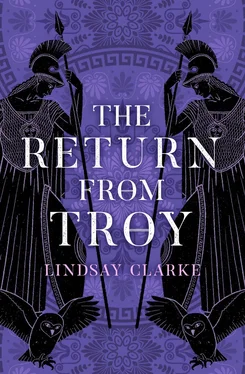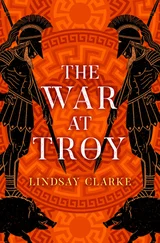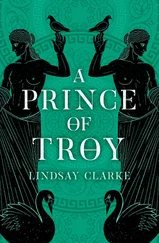‘I see that the Lady Lotus has made you merry this evening,’ Hanno smiled as he came up beside them.
Odysseus made a wide gesture of welcome. ‘Come and join us. We’ve got plenty more in these rather handsome jars we lifted from Priam’s palace.’ But when Hanno politely declined the offer, his presence had a subduing effect on their jollity. Glaucus began to hum a song that was dear to him. Young Elpenor, whose head of blond curls now rested in a young woman’s lap, made only a poor effort to suppress an attack of giggles. Otherwise the group was silent for a time beneath the moon.
That casual reference to the sack of Troy had briefly lent a gloomy cast to Odysseus’ mind; yet he had no sooner observed the change than he seemed to float off into a more tranquil zone some distance away from his still weary body.
And it was not at all the same experience as being drunk with wine, for there was a startling clarity that came with it – a heightened sensitivity to every small sound chivvying the quiet air: the high-pitched shrilling of the cicadas, the choral belch of bullfrogs, the swishing murmur of the surf. He could also pick out the quite distinct scents of the salt-breeze off the sea, the sweet smell of the lotus and the nocturnal fragrance of jasmine and moon-flowers. Then he became fascinated by the burn-marks scarring the skin of Hanno’s temples as though the man had once been branded there. With uncharacteristic forwardness he asked about them.
‘The marks are customary among my people,’ Hanno diffidently replied.
‘As a sign of dedication to a god?’ Odysseus pressed. ‘Nothing so mysterious, I’m afraid. Our mothers burn their infants here and here,’ Hanno indicated the marks on his own head, ‘with a smouldering piece of flock from a sheep’s fleece. We believe that it induces clarity of mind in later life.’
‘A pity that Agamemnon wasn’t born in Libya,’ Demonax muttered. ‘The war might have been over years ago.’
‘It might never have begun at all,’ said Odysseus. Then to stave off the shadow once more, he asked Hanno to tell them more about the various peoples among whom he had travelled and the customs that distinguished them.
And so, as the moon mounted the sky, he was taken on a voyage of the imagination across the wide regions of Libya, through countries where the women wore bronze leg rings, where men had mastered the art of harnessing four horses to their chariots, and where the dead were buried seated upright in their tombs. Hanno told him about his own people, the Garamantes, who took no interest in the arts of war, and of another tribe who were defeated in a war with the south wind which left them buried deep beneath the sands.
‘Meanwhile, to the west,’ he said, ‘around Lake Tritonis, can be found a cult of warrior maidens who serve the one you call Athena. She has her shrine and oracle there.’
Among the many marvels he listed, Hanno spoke of a spring called the Fountain of the Sun that was known to run both hot and cold according to the time of day; of oxen which walked backwards as they grazed because otherwise their long horns would get stuck in the earth; of an obscure race of troglodytes who fed mostly on serpents and spoke a language like the screeching of bats; and of a tribe of bee-keepers who painted their skins bright red and feasted on monkeys. He spoke also of a city he had seen that was built from blocks of salt – some white, some purple – by a people who were never visited by dreams.
‘Their land stretches to what you Argives call the Pillars of Heracles,’ Hanno declared, ‘but beyond that realm I have not travelled myself. Yet I have heard stories of dense forests to the south where elephants and horned asses abound; and two-legged creatures with the faces of dogs, and people without heads who bear their eyes in their bosoms; but apart from elephants, I have never seen such things myself. Also those traders who follow the sun around the coast tell of a land where gold is plentiful. Because its people speak no language that can be understood, the Phoenicians do business by leaving their goods on display at the shore and then withdrawing until the local people have determined the value of those goods in gold. Then they too withdraw so that the visitors can consider what is offered. If the Phoenicians think the measure of gold insufficient, they withdraw again until more gold is brought. The goods change hands only when both sides are satisfied. They call this honourable custom the silent trade .’
Listening to the Libyan’s stories under a black night thick with stars, Odysseus felt the universe expand around him. On Ithaca he had always been the one who returned with tales to make his kinsmen marvel. His reputation as an adventurer ran right across Argos to Thessaly and beyond. He had sailed eastwards as far as Sidon. People in Cyprus and Egypt spoke admiringly of him. Yet here in Zarzis, at the northern margin of a continent that stretched southwards, if Hanno was to be believed, for many hundreds of miles across deserts and forests and snow-crowned mountains and lush plains haunted by curious beasts, he felt as though he had been no more than a village pedlar bragging that his name was well-known in nearby towns. And the longer he listened, the more his heart stirred with the aching thrill of wanderlust that had fired him in his youth.
The night shimmered around and inside him. His mind became a map of unknown regions. He remembered a time, many years earlier when he had talked with Theseus of voyaging out past the Pillars of Hercules and on around that exotic coastline just to see what was there. Surely that was the spirit in which life ought to be lived? That was how Jason and his Argonauts had unlocked the secrets of the Black Sea trade in gold. That was how Theseus had dared the ancient might of Crete and brought it under his subjection. Let the crass Agamemnons of this world destroy and plunder as they wished. Henceforth it would be his mission to enlarge the world of men, to bring light to dark places, to foster trade and the profitable exchange of culture, to kindle the imagination.
His own imagination was scintillating with that very thought when, as abruptly and noiselessly as his companions around him, Odysseus dropped like a bull at an altar into a sleep as crowded with wonders as the huge Libyan night.
He woke late the next morning feeling a stiff twinge in his old thigh wound. Elsewhere, his headache might have put him in a foul mood for the rest of the day; here in Zarzis he felt surprisingly mellow – as though the pain provided an excuse, were any excuse needed, to laze in the shade with his indolent friends. At their encouragement he broke his fast on goat’s milk and a dish of the sticky lotus mashed with oatmeal that was served to him in a calabash by a woman with a benevolent, gap-toothed smile. Later in the day he would find that food was not all she had to offer and only a residual qualm of conscience reminded him that he was on his way home to Ithaca where his wife faithfully awaited him.
Yet the greater temptation was to sleep, for here in Libya, sleep had proved to be a banquet of the senses in which an endlessly intriguing landscape unfolded round him, where curious beasts and monsters flourished, and everything made a bizarre kind of sense. Deciding that his ambitious vision of the previous night would take time to plan, he soon turned over on his side beneath the awning and closed his eyes against the light.
Afterwards, Odysseus would have difficulty recalling how much time had passed while he and his men lay about the shore of Zarzis, eating, drinking, fondling the women who made themselves available, and smiling with contentment at the complaisant men of the region, who appeared to have as little sense of urgency as they did themselves.
Читать дальше












